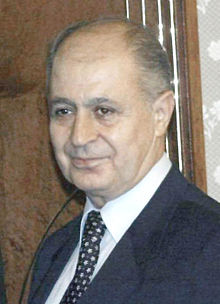
Back أحمد نجدت سيزر Arabic احمد نجدت سيزر ARZ Ahmet Necdet Sezer AST Сезер, АхӀмет Неждет AV Əhməd Necdət Sezər Azerbaijani احمد نجدت سزر AZB Ахмет Недждэт Сезер Byelorussian Ахмед Сезер Bulgarian Ahmet Necdet Sezer Catalan Ahmet Necdet Sezer Czech
Ahmet Necdet Sezer | |
|---|---|
 Sezer in 2002 | |
| 10th President of Turkey | |
| In office 16 May 2000 – 28 August 2007 | |
| Prime Minister | |
| Preceded by | Süleyman Demirel |
| Succeeded by | Abdullah Gül |
| President of the Constitutional Court | |
| In office 6 January 1998 – 4 May 2000[1] | |
| Preceded by | Yekta Güngör Özden |
| Succeeded by | Mustafa Bumin |
| Personal details | |
| Born | 13 September 1941 Afyonkarahisar, Turkey |
| Political party | Independent |
| Spouse | Semra Kürümoğlu |
| Children | 3 |
| Alma mater | Ankara University, Law School |
| Profession | Judge |
| Signature |  |
Ahmet Necdet Sezer (Turkish pronunciation: [ah'med nedʒ'det se'zæɾ]; born 13 September 1941[2]) is a Turkish statesman and judge who served as the tenth president of Turkey from 2000 to 2007. Previously, he was president of the Constitutional Court of Turkey from January 1998 to May 2000. The Grand National Assembly of Turkey elected Sezer as president in 2000 after Süleyman Demirel's seven-year term expired. He was succeeded by Abdullah Gül in 2007.
Following his legal career, Sezer became a candidate for the presidency with the joint support of many political parties in Parliament. Following the 2000 presidential election, he took an ardent secularist approach on issues such as the headscarf, holding the view that secularism in Turkey was under threat. A quarrel between Sezer and Prime Minister Bülent Ecevit in 2001 led to a financial meltdown, attributed to the weakness of the coalition government as well as to the large debt owed to the International Monetary Fund.
The landslide victory of the conservative Islamist Justice and Development Party (AKP) in the 2002 general election led to strong opposition from President Sezer, who vetoed several proposed laws and referred others to the Constitutional Court. These included laws on banking reform and the lifting of the political ban on Recep Tayyip Erdoğan. During receptions at the presidential palace, Sezer refused to allow women wearing the headscarf to attend citing the laws on the separation of religion and state at the time; this resulted in the wives of Abdullah Gül and Erdoğan, Hayrünnisa Gül and Emine Erdoğan respectively, being barred from attendance. Erdoğan later said in public that he had 'suffered a lot' from Sezer.[3]
- ^ "Ahmet Necdet SEZER | Anayasa Mahkemesi".
- ^ "Presidency of the Republic of Turkey : Ahmet Necdet SEZER".
- ^ TE Bilisim - Abdullah Tekin. "Başbakan: Ahmet Necdet Sezer'den çok çektim". haberpopuler.com. Retrieved 24 May 2016.